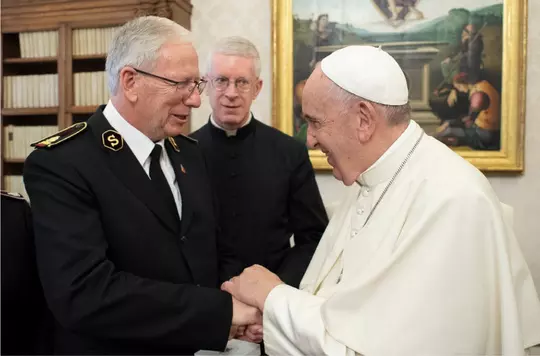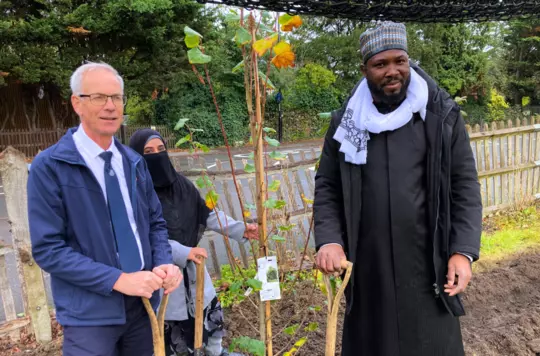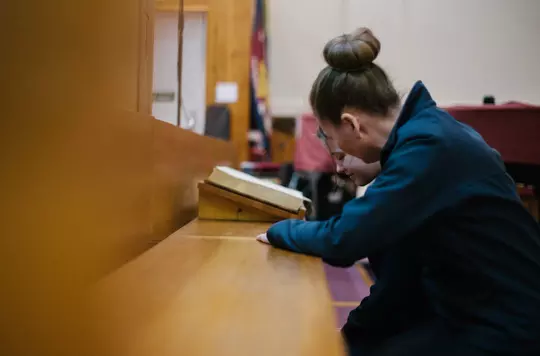20 January 2024
How The Salvation Army works with other churches
Lieut-Colonel Jonathan Roberts

During the Week of Prayer for Christian Unity, Lieut-Colonel Jonathan Roberts highlights aspects of the territory’s ecumenical strategy.
By now we should all have unwrapped our Christmas presents and started to enjoy them. But what if one gift were put on a shelf on Christmas Day and remained there, wrapped up and ignored? Perhaps that’s unlikely, but something similar can happen with Christian unity.
Unity is God’s gift to his people, received when we accept Jesus as Saviour and Lord. In that moment we are spiritually united to all other believers – we become part of the body of Christ, joined together by the Holy Spirit.
But that’s not the end of the story. The gift of unity needs to be unwrapped, explored, enjoyed and put to good use. When we do that, we begin to answer the prayer of Jesus that ‘all of them may be one, Father, just as you are in me and I am in you’ (John 17:21).
Unity as a gift to be used and enjoyed is a key principle motivating our ecumenical engagement. And there are two other important principles.
First, unity is not uniformity. We can pursue Christian unity while retaining our distinctiveness, and this diversity can strengthen and enrich the life of the Church.
Second, unity and mission belong together. They are not separate – let alone competing – activities but are two sides of the same coin. Unity is missional. As that prayer of Jesus goes on to remind us, we are called to be one ‘so that the world may believe’ (John 17:21).
To encourage us not to ignore the precious gift of unity, the UK and Ireland Territory has devised a strategic plan for ecumenical and interfaith engagement. I wrote about the interfaith element in November and the Week of Prayer for Christian Unity is a good opportunity to focus on the ecumenical element.
Central to the strategy is the concept of koinonia, a Greek word that has been translated as ‘fellowship’ (see 1 John 1:3) or ‘partnership’ (see Philippians 1:4 and 5). So koinonia is relational and missional. It is about face-to-face encounter with fellow Christians (fellowship) and side-by-side service to the world (partnership).
That dual understanding is captured in our strategic purpose for ecumenical work: ‘To support Salvationists at all levels as they build relationships and partnerships with other Christians.’
To achieve this purpose – to unwrap the gift of unity – there are several priorities we need to focus on.
The first is to enable corps members to engage more fully with Christians belonging to other churches. This highlights the significance of local ecumenism. The unity of the Church is perhaps most clearly seen when churches in the same community work, worship and witness together.
To support this crucial local emphasis, corps are encouraged to make the most of opportunities for ecumenical reflection and action. This could include being part of a Churches Together group, participating in joint outreach and joining in annual events such as the Week of Prayer for Christian Unity, ecumenical Lent courses or Thy Kingdom Come, the prayer initiative that takes place between Ascension Day and Pentecost – last year, the launch of this took place at Regent Hall.
Ecumenical chaplaincies are another way in which Christians work together locally. These exist in many settings, such as prisons, hospitals, airports, shopping centres, schools and colleges – and we want to encourage Salvationists to be part of them.
If unity and mission go together, then entering missional partnerships with other churches is something that corps need to consider seriously. This could involve sharing a building with another church and worshipping either together or at separate times. It could involve forming missional partnerships to serve the community, such as a food bank, lunch club or children’s project. Corps are encouraged to think about these kinds of partnerships when they are working through their missional journal.
If the first priority is to enable local ecumenical engagement, the second is to ensure that DHQs support this work in the best way possible. This support will usually be given by divisional ecumenical officers (DEOs), who have this role in addition to their appointments as corps or divisional officers.
While part of a DEO’s role might be to represent the Army in regional ecumenical groups, their main responsibility is to support, encourage and resource the ecumenical work of corps. DEOs in turn need to receive support. So there is a new online network for them to share ideas and experiences as well as individual online meetings with Territorial Ecumenical Support Officer Major David Evans.
A third priority is to enable Salvation Army participation in ecumenical and interfaith councils and networks. We want to make sure that those who represent the Army in local, regional or national ecumenical groups are equipped with appropriate information and guidance. We also want to enable and encourage them to give feedback to their corps, DHQ or THQ so that awareness is raised and good practice shared.
Finally, for the Army’s ecumenical engagement to be as effective as possible, the THQ Ecumenical and Interfaith Unit will research, develop and provide ecumenical guidelines and resources. A booklet has already been produced, A Brief Guide to Ecumenical and Interfaith Matters, and an ecumenical Learning and Development course is proposed for later in the year.
As we unwrap the gift of unity we will discover how much the Army can enrich other churches and how much we can be enriched by them. This gift will enable us to serve the world more effectively as we work together in mission.
Written by

Lieut-Colonel Jonathan Roberts
Divisional Commander, Wales
Discover more

Supporting and developing the ecumenical and interfaith work of The Salvation Army.

Ahead of Inter Faith Week (12–19 November), Lieut-Colonel Jonathan Roberts considers the importance of interfaith harmony.

Major Steve Dutfield reflects on how a shared sense of belonging is connected to discipleship.
